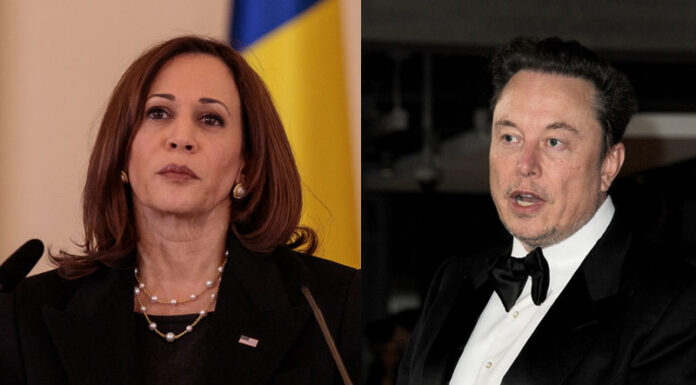Former Vice President Kamala Harris delivered criticism of Department of Government Efficiency chief Elon Musk at Australasia’s largest real estate conference on May 25, 2025. She addressed his comments that empathy is a fundamental weakness of Western civilization.
Speaking to 4,500 real estate professionals at the Gold Coast Convention and Exhibition Centre in Queensland, Australia, Harris addressed what she saw as a misunderstanding of leadership strength. Though she did not name Musk directly, she referred to “someone that is very popular.”
In March 2025, Musk stated on The Joe Rogan Experience podcast that “the fundamental weakness of Western civilization is empathy, the empathy exploit.” The Tesla and SpaceX CEO argued that adversaries use Western societies’ empathetic responses as vulnerabilities, describing it as “civilizational suicidal empathy.”
Harris countered this viewpoint, criticizing what she perceives as Musk’s flawed leadership philosophy. She suggested that the DOGE chief wrongly believes strong leadership involves intimidation and dominance, while she argued that true strength lies in curiosity, concern, and care for others’ well-being.
This was Harris’ first speaking engagement in Australia since her November 2024 election defeat to President Donald Trump. Conference founder John McGrath introduced her as one of history’s most successful women, while Harris humorously acknowledged her current state of unemployment to the crowd.
Her critique of Musk extended to concerns about the rise of global authoritarianism. Harris urged remembering the 1930s and highlighted the importance of trust-based relationships and integrity in maintaining democratic values.
The exchange highlights a philosophical divide between Harris and Musk, who is an influential adviser to President Trump. Musk’s appointment to lead DOGE reflects the administration’s focus on reducing federal spending, with a target of $1 trillion or more in cuts. Trump’s embrace of Musk’s Mars colonization goals is part of America’s manifest destiny.
Musk’s empathy comments on the Rogan podcast were part of a broader discussion about immigration and cultural preservation. He credited Canadian scholar Gad Saad with the idea of “suicidal empathy,” suggesting that excessive compassion can lead to societal self-destruction. Musk acknowledged the positive aspects of empathy but argued that it becomes dangerous when used to manipulate well-meaning individuals.
The billionaire’s statements have found support in conservative circles, where traditional views on empathy face increasing scrutiny. High-profile Christian conservatives have echoed similar warnings about empathy being exploited for political purposes, marking a shift in how some conservative leaders frame compassion in governance.
Harris’ appearance comes amid questions about Musk’s role within the Trump administration. The Tesla CEO has faced criticism for controversial gestures and social media posts interpreted by many as signals to white supremacist groups. His gesture at the January 20, 2025 inauguration rally sparked debate, with critics arguing it resembled a Nazi salute, while supporters dismissed it as awkward enthusiasm.
The controversy involved Musk placing his right hand over his heart before extending his arm upward at a 45-degree angle with the palm facing down. He repeated this while addressing crowds at Capital One Arena, saying his heart went out to Trump supporters. Neo-Nazi and white supremacist groups celebrated the gesture on social media as validation of their beliefs.
Several European politicians called for Musk to be banned from their countries following the incident. German officials were particularly concerned, given their nation’s history and laws prohibiting Nazi gestures. The Anti-Defamation League defended Musk, characterizing the gesture as awkward enthusiasm rather than intentional symbolism, though other Jewish organizations disagreed.
During her Gold Coast appearance, Harris shared anecdotes from her time as California Attorney General, including rejecting a $4 billion settlement offer from major banks during the foreclosure crisis. She recounted a heated phone call with JPMorgan Chase CEO Jamie Dimon, who accused her of trying to steal from shareholders when she deemed the offer inadequate.
Harris’ criticism of Musk reflects broader Democratic concerns about his political influence and rhetoric. As DOGE leader, Musk has initiated disruptions across federal agencies, including the Social Security Administration and the Treasury Department. His recommendations for spending cuts typically receive departmental approval.
The philosophical clash between Harris and Musk underscores fundamental disagreements about leadership, governance, and empathy in democratic societies.
Academic experts studying empathy have challenged Musk’s views, arguing research shows empathy’s positive societal contributions rather than weakness. Canadian social psychologist Greg Depow noted Musk’s claims rest on false assumptions about empathy levels in Western societies and incorrect assessments of empathy’s impact.
Musk has announced a reduction in his political engagements, stepping back from the Department of Government Efficiency to focus more on Tesla and SpaceX. He committed to spending only one to two days per week on government matters.
Despite these statements, reports suggest Musk’s influence persists through associates in key positions within DOGE and other federal agencies. However, his direct involvement and visibility in the administration have diminished, with President Trump ceasing to mention Musk in public communications, and Musk’s presence at White House briefings has decreased.








